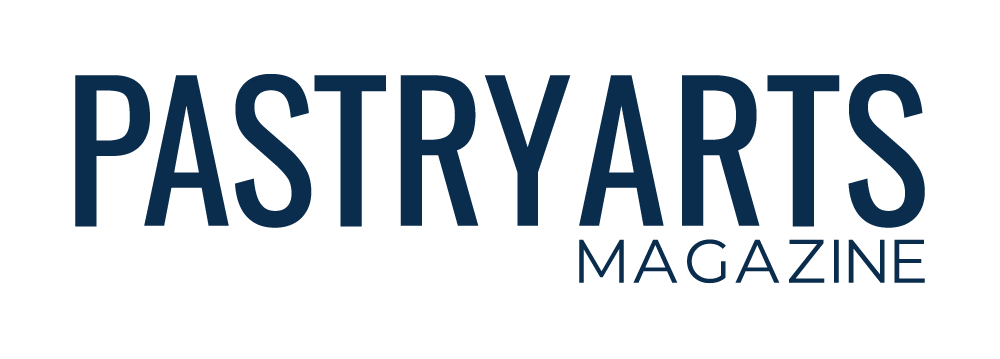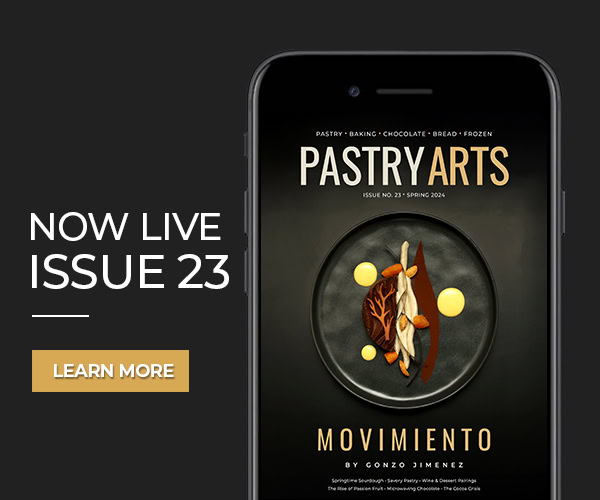(This article appeared in the Winter 2021 issue of Pastry Arts Magazine)
Born in Chicago and raised in Maywood, Illinois, Chef Kimberly Brock Brown’s career began taking shape once she graduated as a chef’s apprentice in 1984. The combination of her passion for food and eagerness to excel brought her to the kitchen even on her days off. As she recalls, “It was no problem for me then to come in at 3:00 in the morning, because I got to learn.” A couple of years later, Chef Kimberly’s dedication to the craft culminated in a promotion to executive pastry chef. At the higher level, she quickly realized it was “sink or swim.” She admits treading water the first couple of years as an executive pastry chef while advancing her knowledge and skills through continuing education classes and seminars, until eventually, she found her rhythm. What happened over the course of three decades is now a blueprint for anyone striving for success as a pastry professional today. Chef Kimberly has done everything from being featured at the James Beard House, authoring her book Here I Am!, starting a wholesale specialty food distributing company, earning her Certified Executive Pastry Chef, Certified Culinary Administrator, and Approved Culinary Examiner designations through the American Culinary Federation, and most notably, becoming the first African-American female chef inducted into the American Academy of Chefs, the Honor Society of the ACF. All in all, Chef Kimberly has dedicated herself to the industry, led by example, and most honorably, constantly helped the next generation of pastry professionals advance in their careers. In our interview, we discuss her career beginnings, thoughts on the immediate changes in the pastry industry, and ask “Where do we go from here?”
What early career adversity did you face that helped to shape you professionally?
After I graduated, I worked with a pastry chef who was so inspiring and wanting people to do better, and like a little sponge, I soaked it up. Because of the way he taught and ran his production, he was an inspiration for me. Then it totally flipped when I got promoted. There was a lack of support that I immediately felt from my new managers. It was like ‘sink or swim,’ you’re the executive now. And I get that, you’re supposed to know, but in your first position as an executive, you don’t know everything. With no support, or the warm and fuzzies I got before, it was a big adjustment. I was treading water a lot in those first couple of years. I asked a lot of questions to people that I worked with. Realizing I needed more education, I talked to my boss, and his boss, to take classes and seminars. I [remember] being paid to go to a marzipan class back in the day, and guess what my Boss does? They book a party that’s got 500 marzipan figures on the plate [laughing]. And I’ll tell you right now, it’s easier if you start off doing 500 or 1000 plates and then go down to doing 100 than it is for you to start your career doing 50 or just restaurant style and then have to all of a sudden do 1000. If you can do production, you can do production anytime, no matter what it is. I definitely had to figure it out [early on] while treading water.
What was an early career win for you or a career inflexion point?
The promotion from being a graduated apprentice in ’84 to executive pastry chef in late ’86. The whole time I was an [apprentice], I had access to the pastry chef and two assistants and learned what, and how, they did things. It was no problem for me then to come in at 3:00 in the morning, because I got to learn. Even on days off, I would come in. I didn’t care, I just wanted to learn. People don’t understand that at this point in time it’s that extra effort that gets you where you need to be. I learned how to set up the schedules, how to run the shop, how to order stuff for a production hotel of that size, learned the recipes, and was allowed to have input. It was very key in my growth and expansion to where I am today. That was a tipping point. Coming out of my apprenticeship, getting that training, and then being promoted.
At this point in time it’s that extra effort that gets you where you need to be.
As you evolved as an executive pastry chef, what was something vital you learned in the role that helped in your overall effectiveness?
 The human aspect of the whole thing and communication. In my experience as a hotel pastry chef, we are so different and cut off from the [savory side]. I remember in my exit interview they asked, “How come the bake shop gets so many overtime hours?” That’s because we have more steps to do. We don’t just take the cake and put it on the plate. We make the cake, filling, icing, decorations, sauces needed to plate it. It’s amazing to me sometimes that people have no clue what goes on in the pastry and baking department. And that’s why it’s the first thing that gets cut when things are getting too tight and they’re looking to save money. Even though it’s a mistake, because there have been many times that that specialty plate, that cake, those turndown services that we’ve done have saved a lot of things. Sweetened the pot. Instead of you comping the meal, give them something else. There’s many a time that baking and pastry production has saved a lot of customer’s complaints. I think the communication between you and management, and then the same communication you have with them, you need to have with your team. Everybody needs to be on the same page.
The human aspect of the whole thing and communication. In my experience as a hotel pastry chef, we are so different and cut off from the [savory side]. I remember in my exit interview they asked, “How come the bake shop gets so many overtime hours?” That’s because we have more steps to do. We don’t just take the cake and put it on the plate. We make the cake, filling, icing, decorations, sauces needed to plate it. It’s amazing to me sometimes that people have no clue what goes on in the pastry and baking department. And that’s why it’s the first thing that gets cut when things are getting too tight and they’re looking to save money. Even though it’s a mistake, because there have been many times that that specialty plate, that cake, those turndown services that we’ve done have saved a lot of things. Sweetened the pot. Instead of you comping the meal, give them something else. There’s many a time that baking and pastry production has saved a lot of customer’s complaints. I think the communication between you and management, and then the same communication you have with them, you need to have with your team. Everybody needs to be on the same page.
Putting the pandemic aside, from when you were coming up until now, what are some of the differences that you see?
 Having gone through an apprenticeship, it’s [the concept of] student loans. I never had student debt because of my apprenticeship. I got paid, went to school, and then the hotel I worked at, as part of their benefits, they reimbursed for education. Now, “What do you mean you’ve got $5,000, $10,000 in student loans, and now you need a 25-cent raise?” So when graduation comes, the next day, “Can I get a dollar raise?” The paper is great. I appreciate you getting it. Now that you’ve got it, tell me what it is that you are doing that’s different to justify this increase to the Chef.
Having gone through an apprenticeship, it’s [the concept of] student loans. I never had student debt because of my apprenticeship. I got paid, went to school, and then the hotel I worked at, as part of their benefits, they reimbursed for education. Now, “What do you mean you’ve got $5,000, $10,000 in student loans, and now you need a 25-cent raise?” So when graduation comes, the next day, “Can I get a dollar raise?” The paper is great. I appreciate you getting it. Now that you’ve got it, tell me what it is that you are doing that’s different to justify this increase to the Chef.
Also, the way we plate desserts has changed. Because the way I plated up back then is not the same. It could be the simplest thing, a poundcake, you’d jazz it up, basically throw some whipped cream and berries on the plate and have a nice day. Now the plating has evolved, and it doesn’t matter what it is – the highfalutin’ desserts will have all the components and pieces and parts, even something as simple as poundcake.
I tell the students all the time, we are still essential people, food and beverage. People have to eat no matter where you are, so you just have to find a way to feed them.
As we’re coming close to nine months of the pandemic, what are you hearing from other pastry chefs or hospitality professionals right now?
It’s real. People are very much affected by it. With [shutdowns or capacity limitations], you can’t bring staff back. You can’t do a lot of production when you’re down to only 50%. And people don’t want that kind of experience of having somebody coming to their table with the mask and gloves, it’s just not what they want to see.
Even without a pandemic, the first thing [places] do to save money is cut the baking and pastry production. So, now, they’re going and getting the Sara Lee or whatever the hot product is now, and the baking and pastry people are hurting. A lot of people that I know pastry-wise, their country clubs or hotels for the most part, not so much the restaurants, they’re okay but it’s still slow. I don’t know where fine-dining restaurants are going to be. So it’s real. The sweet side is not very sweet right now, it’s hurting.
How do you think things need to evolve right now for the pastry industry?
 I tell the students all the time, we are still essential people, food and beverage. People have to eat no matter where you are, so you just have to find a way to feed them. If it’s a grab-and-go or package kind of thing, then that’s the way it’s going to have to be until it gets back to whatever the new normal is going to be. And so if it’s a tart, cake, pie, cookie, whatever it is, then how do you package it and get it out? Do you start a website, an online business? Do you get in touch with a couple of restaurants in your area for them to add [your products] to their to-go’s or delivery service? I don’t see really too many restaurants coming back at this point in time. The [COVID-19] numbers are going back up again and getting crazy. So, I really do believe grab-and-go is going to be the solution. It will be all in how you can package something up and the collaborations of other places or entities coming together. Sitting around is not going to get it, if you’re hungry, you’re hungry. You go and knock on doors or make phone calls. You make those connections. But I say to people all the time, don’t wait until a pandemic or emergency to have those connections. You need to be meeting people all the time. You can’t be head down working and just making great desserts, great food, whatever, all the time. You’ve got to look up, take those blinders off, because you’re missing so much more. You don’t know who just walked by, who you just missed the opportunity to meet, when you don’t get yourself out there. Go to different events in your area and network. Have your card ready, if you don’t have a card, have an index card, and put your name and get theirs too, a phone number, email, whatever. But always, always network and meet people. You don’t know who you’re going to see. And it’s not always who you know, but who knows the people you know too.
I tell the students all the time, we are still essential people, food and beverage. People have to eat no matter where you are, so you just have to find a way to feed them. If it’s a grab-and-go or package kind of thing, then that’s the way it’s going to have to be until it gets back to whatever the new normal is going to be. And so if it’s a tart, cake, pie, cookie, whatever it is, then how do you package it and get it out? Do you start a website, an online business? Do you get in touch with a couple of restaurants in your area for them to add [your products] to their to-go’s or delivery service? I don’t see really too many restaurants coming back at this point in time. The [COVID-19] numbers are going back up again and getting crazy. So, I really do believe grab-and-go is going to be the solution. It will be all in how you can package something up and the collaborations of other places or entities coming together. Sitting around is not going to get it, if you’re hungry, you’re hungry. You go and knock on doors or make phone calls. You make those connections. But I say to people all the time, don’t wait until a pandemic or emergency to have those connections. You need to be meeting people all the time. You can’t be head down working and just making great desserts, great food, whatever, all the time. You’ve got to look up, take those blinders off, because you’re missing so much more. You don’t know who just walked by, who you just missed the opportunity to meet, when you don’t get yourself out there. Go to different events in your area and network. Have your card ready, if you don’t have a card, have an index card, and put your name and get theirs too, a phone number, email, whatever. But always, always network and meet people. You don’t know who you’re going to see. And it’s not always who you know, but who knows the people you know too.
You just have to figure out how to present better, especially if it’s a to-go situation. And I believe we need to keep things on a healthy level, because people are very concerned about that, as well.
Pandemic or not, what are some tried and true principles that will best serve pastry and baking professionals?
Finding creative ways to give people joy with food. Even if it’s something that we have to start packaging, when you open up that box, whatever it is, how does it look? Give people that excitement of ‘I just ordered this, I can’t wait to eat this,’ feeling. The same ambience experience is not there, so the presentation is that wow factor. You just have to figure out how to present better, especially if it’s a to-go situation. And I believe we need to keep things on a healthy level, because people are very concerned about that, as well. So how do you make a brulée or a cheesecake a little heather and still satisfying so they come back and get more, because one is not going to cut it, you got to have repeat customer business.
What are your final thoughts or message to the next generation of pastry and baking professionals coming up in this time right now?
This is temporary – we are still a much-needed career. People are always eating and drinking no matter where you are. It’s just a matter of you figuring out how you can best feed people. I think that’s going to be the key.
Make sure you’re always networking – always. You can never not need people. I’m an introvert. I can sit in my house all day long and not do a thing, but when I know I have to go, I have to go. I know I need to be meeting people and always expanding who I know, and who knows me. And I understand the intimidation factor with meeting a seasoned chef. I know when I was an apprentice at ACF, you did not want to be in the room with those chefs, they scared us. But you have to make sure you are meeting people.
Always learn something different if you can, and don’t be afraid to stretch out and go to the savory side for baking and pastry, because there are a lot of savory desserts now. People are not eating as much sugar now. I remember the first time somebody did a thyme and ricotta cheesecake for me I said, “What in the world?” But it was so good. Now it’s nothing to put some rosemary, thyme, whatever, in a dessert to make them less sweet. So, there’s always something to learn, just be open-minded.






You must be logged in to post a comment.